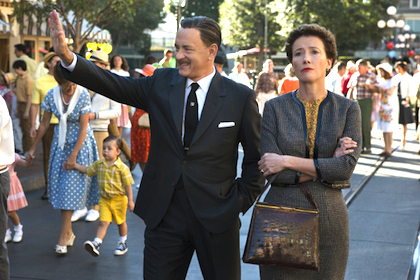'Saving Mr. Banks', And Our Inner Child

Maybe I’m just a cynical man, but it seems like today, cynicism is a much easier pill to swallow then lets say, a spoonful of sugar or a catchy sentence written by a self-assured cinephile. “And hello to you too” is how you might respond to this somewhat out-of-left-field opening remark, so let me explain to you a bit about where I’m coming from...
I recently saw Disney’s Saving Mr. Banks, and I must confess that my sarcastic little heart grew three sizes on that day. Yes, I enjoyed the movie. Aside from what many are calling a syrupy sweet piece of fiction, I believe the movie also contains top-notch performances from Emma Thompson and Tom Hanks, as well as some very fine examples of visual storytelling. As it stands, the film is currently holding at 81% on rottentomatoes.com, and while that is certainly not a bad score, it does indicate that some critics out there are not as pleased with the flick as Yours Truly.
Many of the film’s detractors are accusing it of being too sappy and sentimental, and I for one can attest that the movie does indeed try to pull at your heartstrings harder than a boy scout troupe trying to win a game of tug-o-war. But is that necessarily wrong? Many people argue that the story cuts corners and leaves out many compelling facts in regards to P.L. Travers’s actual reaction to Mary Poppins or Walt Disney’s actual real-life demeanor. What people seem to forget is that this is nothing more than a fairytale that is being told to us. It is a conscious decision made upon the part of the filmmakers to tell us a pleasant little story (based somewhat upon fact) about the making of Mary Poppins. They did not promise a history lesson or an Oliver Stone-style film that exposes scandal and real-life horror. As it stands, there were some amusing circumstances in the actual creation of the film Mary Poppins that a few people thought could be made into an interesting film, and that’s all there really is to it. But the argument of those against the film is that it completely ignores history in favor of sap. But again, I ask you, when has ignoring facts ever been a problem?
There are a quite a few great films out there that will continue to be heralded despite the fact that they pretty much got everything about their subject matter wrong. The Untouchables is a wonderful film, directed by Brian DePalma, that tells the story of Elliot Ness and his battle against notorious gangster Al Capone. A good deal of what you see on the screen is completely false. But you will not hear many people speak out against it, because the film favors stylized adventure over sentimentality. It’s a lot easier for people to say that they enjoyed a good adventure/action movie then it is for them to say that they enjoyed a funny little movie filled with optimism and hope. The Fugitive is another example of a film based on a true story, but was dragged through the Hollywood machine until it came out the other end barely even resembling the subject matter upon which it was based. And that is perfectly okay because it is an absolutely brilliant film due its exciting pace, absorbing performances, and all around excellent storytelling.
Saving Mr. Banks is a sweet little story about why certain storytellers exist. The movie does not hide the fact that Mrs. Travers and Walt Disney, as seen in the film, are highly stylized versions of the real people. They are two storytellers who know for a fact that the world is not a magic kingdom filled with mirth and merriment, and yet they still create their silly little stories so that the children can have happy childhoods and adults can have something hopeful to strive for. And that is exactly what this film is trying to do as well.
The biggest falsehood that film lovers like myself put up with everyday, is the one that every movie should be held to the same standard. “Movies should be truthful” is the grade-school mantra shrieked by many a cinephile. Yes, they should be truthful, but only within the confines of the world that they have created. Most, if not all, movies are lies, but the better ones are filled with human truths (not necessarily facts) that the audience can find relatable, or ones that they aspire to relate too.
As I said earlier, I’m a pretty skeptical person. Much of the happiness and cheer seen in Saving Mr. Banks, is not to be found in my day-to-day activities in NYC. But for many people I know, it is a part of their lives, or they are working hard in order to make them so. Saving Mr. Banks may seem naive to some, but I for one think that it’s an admirable film with more craft and skill put into it than many people are giving it credit for. Would the real-life story of what actually happened behind the scenes of Mary Poppins be more enjoyable? Possibly, and if they ever make that film, I will definitely go see it, and I can assure you that it won’t tarnish my opinion of Saving Mr. Banks in the least. The theoretical “real-life” version will be about truth and the harshness of reality. Saving Mr. Banks is about hope. Of course, as thinking individuals, we should not bury our heads in the sand in favor of fairytales. But, a little magic every now and then couldn’t hurt either.




